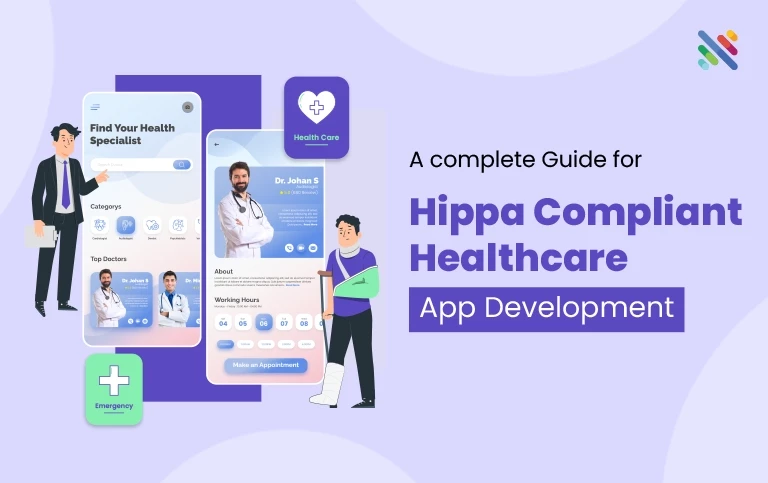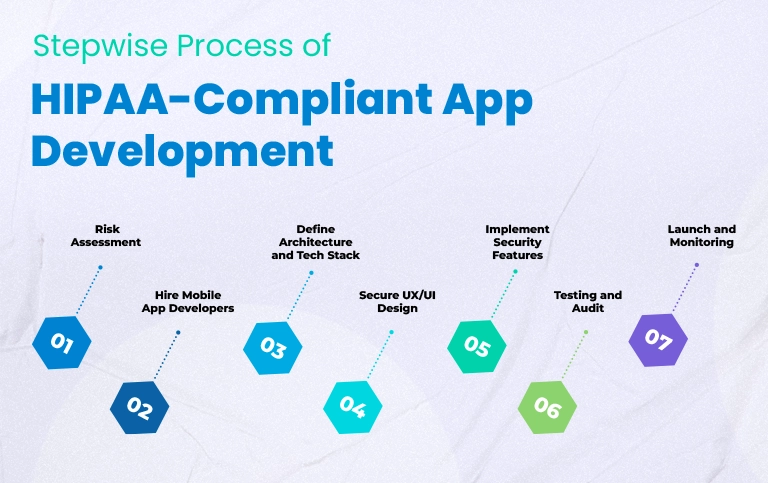
The adoption of digital transformation in the healthcare sector is truly vast. In this regard, developing HIPAA-compliant applications has become unavoidable; rather, they have attracted the status of essentiality, as they hold a pivotal role in the patient's care, administration, and communication facets. Liability becomes urgent if the patient's privacy is compromised and there are severe consequences from non-compliance; thus, the utmost understanding of HIPAA Compliance within the HIPAA Healthcare App Development arena has to be the utmost understanding.
Whether you are a healthcare provider in association with or working for a startup or an IT person who has closely involved himself or herself with the project, here, all the information needed for developing secure and compliant healthcare apps will be provided to you as you set sail. It touches on all aspects, from what Protected Health Information (PHI) is to selecting the right tech stack and Mobile App Developers to partner with so that you can boldly embark on your next project.
What is HIPAA, and Why is It So Important?
Following the abbreviation defined above, HIPAA means Health Insurance Portability and Accountability Act. HIPAA gives the definition of the Act, which was initiated in 1996 in the U.S. for the sake of privacy and securing patients' health data. This Act complements the ways of the collection, storage, or even sharing of sensitive information when it protects most of what falls into categories as Protected Health Information (PHI).
Beyond a mere legal obligation, HIPAA is a responsibility when a form of PHI is stored or transmitted via your healthcare app. Non-compliance here comes with heavy fines and lawsuits and, even worse, destructive harm to your brand reputation. Therefore, education about and adherence must apply when it comes to anything considered by HIPAA.
What is Protected Health Information (PHI)?
What actually qualifies as Protected Health Information (PHI)? Only the definitions of PHI propel your journey towards developing HIPAA-compliant applications. PHI is the term that refers to any health data that becomes linked to a particular patient; it includes the following:
- Patient names
- Medical records
- Biometric identifiers
- Lab results and diagnosis
- Health insurance information
- Social Security numbers
- Emails connected to health information
Any mobile application that collects, processes, or stores this sort of data must follow HIPAA Compliance guidelines.
Major HIPAA Rules App Developers Should Know
Four main rules every Mobile App Development team should be aware of:
Privacy Rule
This rule defines how PHI can be used and disclosed, ensuring that patients are given rights regarding how their health data is treated and that they have access to their medical records.
Security Rule
This rule describes the security measures for PHI held/controlled electronically, that is, measures such as encryption, access control, or secure methods of data storage.
Breach Notification Rule
In the event of a breach of PHI, HIPAA requires that notification be given to affected patients and authorities.
Enforcement Rule
Penalties are given according to their severity based on non-compliance, which can be anywhere from $100 to $50,000.
These rules must be strictly adhered to throughout every phase of the development cycle of a Healthcare Application.
Essential Features of a HIPAA-Compliant Healthcare App
Building and designing a compliant and safe healthcare application must have features that conflict with HIPAA compliance and user experience. The following are the feature sets that need to be integrated into the application:
Data Encryption
Encryption of sensitive data in transit and at rest protects it from being misused.
Secure User Authentication
Multi-Factor Authentication (MFA) and Role-based Access Controls for authenticating users.
Audit Logs
Logs containing all details of data access and user activity must be maintained in accordance with audit and breach notification rules.
Automatic Logouts
Session time-out minimizes PHI exposure due to unattended data left on devices.
User Consent Forms
Digital consent forms should be built in, informing the patients how their data will be used.
Stepwise Process of HIPAA-Compliant App Development
HIPAA compliance encompasses more than awareness of the requirements; it encompasses strategic planning during the app development lifecycle. This step-by-step guide will help you identify and mitigate possible security threats, hire the right developer(s), define a secure architecture, and set up fortified security features, thereby ensuring your app is HIPAA-compliant from the get-go.
Step 1: Risk Assessment
Start by assessing your system's possible security risks and weaknesses that could expose PHI.
Step 2: Hire Mobile App Developers With HIPAA Experience
It is mandatory to hire developers who have the right knowledge about the legal implications and technicalities of HIPAA-compliant app development. You need to hire Android Developers or iOS specialists to ensure they understand HIPAA end-to-end.
Step 3: Define Architecture and Tech Stack
The application should be built on a secure architecture; therefore, it becomes cloud-based with HIPAA-compliant storage like AWS, Google Cloud, and Microsoft Azure. The right tech stack and its frameworks assist greatly with encryption, authentication, and scalability.
Step 4: Secure UX/UI Design
When designing user interfaces, keep in mind that they are secure and user-friendly. Avoid the possibility of auto-filling sensitive fields, mask input for passwords, and offer intuitive navigation accessible for all ages.
Step 5: Implement Security Features
This includes end-to-end encryption, secure APIs, token-based authentication, and routine backup of data.
Step 6: Testing and Audit
A third party will conduct exponentially rigorous security testing, such as penetration testing and code reviews, to audit and validate HIPAA Compliance.
Step 7: Launch and Monitoring
Continually monitor the application's performance post-deployment, introduce intermittent audits, and revise the security protocols accordingly.
Choosing Between Native, Hybrid, or Cross-Platform Development
When setting up a Healthcare App Development plan, the first significant decision is choosing a development strategy, with advantages or disadvantages mostly on the side of concepts such as HIPAA Compliance.
Native App Development
Native App Development implies building two separate apps, one for Android and another for iOS, offering more freedom concerning hardware security and performance. This is said to be a better choice if any platform-specific features are needed.
In case you are targeting Android users, go for Android App Development Services. The hired Android developers should have ample experience in securing PHI on the Android platform.
Hybrid App Development Services
This pathway allows for the building of apps to run on multiple platforms using a single codebase. To be cheaper, your Hybrid App Development Services provider has to be rich in cross-platform security protocols.
Cross-Platform Development
Similar to hybrid apps but with better performance, engines such as Flutter and React Native are used. The balance between speed and security still requires rigorous compliance checks.
Technologies Underlying the Development of HIPAA Compliant Apps
To create the strongest and most scalable HIPAA-compliant app Development, you must integrate the following technologies:
- Hosting over Cloud (HIPAA-compliant): AWS, Azure, Google Cloud
- Encryption for Database: PostgreSQL, MySQL+TDE(Transparent Data Encryption)
- APIs under security: RESTful APIs with OAuth 2.0, SSL/TLS
- Monitors for Authentication: Firebase Auth, Auth0, Okta
- Monitoring Tools: New Relic, Sentry, Datadog
Ensure that your Mobile App Developers are trained to set up these technologies correctly.
Mistakes to Avoid
Even with adequate experience, if the following suggestions are overlooked, these teams may fall short of HIPAA Compliance:
- Third-party service compliance: Confirm whether any other third-party tools or plugins are to be used to comply with the HIPAA standard.
- Business Associate Agreements (BAAs) have not been signed: All vendors dealing with PHI should sign a BAA.
- PHI being stored within local storage: Absolutely, use secure, encrypted cloud storage.
- Weak authentication mechanisms: Deny simple username and password authentication.
- Missing documentation: Keep records for all processes, policies, and training.
Such errors can be avoided by hiring dedicated developers who exhibit prior successful experience in HIPAA-compliant app Development.
Cost of HIPAA-Compliant App Development
The cost can vary widely based on features, platforms, and development type. Here’s a rough estimate:
App Type | Estimated Cost Range |
MVP with basic features | $40,000 – $60,000 |
Full-featured HIPAA app | $70,000 – $150,000+ |
Using Hybrid App Development Services | $50,000 – $100,000 |
Although it can sound reasonable in cost, it has great returns on investment, especially in avoiding non-compliance risks.
Why You Should Hire Mobile App Developers Specializing in Healthcare?
The likelihood of a generic development team understanding the nuances of Protected Health Information (PHI) or how things play with HIPAA Compliance is slim. Hence, the importance of Hire Mobile App Developers specializing in health care is emphasized. Either go for Hire Android Developers or cross-platform specialists, but check for experience, security knowledge, and industry certifications.
Android App Development Services will also help conduct consultations until the project launch. If you are looking for tighter integration, hiring dedicated developers or outsourcing to a team with specialized Hybrid App Development Services guarantees your app is built right from the start.
Conclusion
In the current digital age of healthcare, HIPAA-compliant app Development is the foundation of successful medical applications. Safeguarding PHI means adhering to the rules and acting morally and in the interest of the company's business itself.
From considering the right Mobile App Developers to implementing security measures to ensure processes are HIPAA Compliant, every aspect of your decision-making should take into account the final achievement of this compliance. Elaborate on whether you will have your Healthcare App Development done from scratch or upgrade an old product. Either way, investment in secure, compliant development goes a long way toward engendering trust amongst patients and providers alike, ensuring better outcomes.
If you're thinking about building a HIPAA-compliant healthcare app, ensure you hire Mobile App Developers with the right expertise. Consider the use case, what security requirements you have, and whether you should pursue Hybrid App Development Services or Android App Development Services. Most importantly, compliance should be put first because there is no way to compromise when it comes to healthcare.
Want Assistance in Developing a HIPAA-Compliant App?
Netclues provides credible, secure, scalable, and compliant mobile app development solutions. Hire our mobile app developers today, or consult with us about your next healthcare app development project.
FAQ Section :
What is HIPAA, and why is it important for healthcare apps?
HIPAA (Health Insurance Portability and Accountability Act) protects patients' health information. HIPAA-compliant healthcare apps ensure that sensitive patient data is secure and handled according to federal regulations.
What are the key features of a HIPAA-compliant healthcare app?
Key features include data encryption, secure user authentication (MFA), audit logs, automatic logouts, and digital consent forms to ensure data privacy and compliance with HIPAA rules.
How much does HIPAA-compliant app development cost?
Depending on complexity and features, the cost for developing a HIPAA-compliant app ranges from $40,000 for MVP apps to $150,000+ for fully featured healthcare apps.
What are the key HIPAA rules developers should know?
Developers should be familiar with the Privacy, Security, Breach Notification, and Enforcement Rule to ensure full HIPAA compliance during app development.
How do I ensure my healthcare app is HIPAA-compliant?
Ensure your app features strong data encryption, secure authentication, and follows HIPAA’s privacy and security rules. Work with developers who are experienced in HIPAA-compliant app development.





